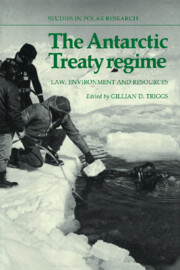Book contents
- Frontmatter
- Contents
- List of contributors
- List of Antarctic Treaty Parties
- Foreword
- Introduction
- Frontispiece: Map of national claims
- Part I Antarctica: physical environment and scientific research
- Part II The Antarctic Treaty regime: legal issues
- 4 Introduction
- 5 The Antarctic scene: legal and political facts
- 6 The Antarctic Treaty system: a viable alternative for the regulation of resource-oriented activities
- 7 The relevance of Antarctica to the lawyer
- 8 The Antarctic Treaty system: some jurisdictional problems
- Part III The Antarctic Treaty regime: protecting the marine environment
- Part IV The Antarctic Treaty regime: minerals regulation
- Part V Whither Antarctica? Future policies
- Part VI Conclusion
- Selected reading
- Appendix 1
- Appendix 2
4 - Introduction
Published online by Cambridge University Press: 20 January 2010
- Frontmatter
- Contents
- List of contributors
- List of Antarctic Treaty Parties
- Foreword
- Introduction
- Frontispiece: Map of national claims
- Part I Antarctica: physical environment and scientific research
- Part II The Antarctic Treaty regime: legal issues
- 4 Introduction
- 5 The Antarctic scene: legal and political facts
- 6 The Antarctic Treaty system: a viable alternative for the regulation of resource-oriented activities
- 7 The relevance of Antarctica to the lawyer
- 8 The Antarctic Treaty system: some jurisdictional problems
- Part III The Antarctic Treaty regime: protecting the marine environment
- Part IV The Antarctic Treaty regime: minerals regulation
- Part V Whither Antarctica? Future policies
- Part VI Conclusion
- Selected reading
- Appendix 1
- Appendix 2
Summary
The four-way veto
Just as all roads lead to Rome so all agreements, recommendations and practices within the Antarctic Treaty system are referrable to and are explained by differing juridical positions on sovereignty. Four groups of state interests can be identified which adopt significantly different legal perspectives on the question of Antarctic sovereignty:
– Antarctic Treaty states which claim territorial sovereignty in Antarctica;
– Antarctic Treaty Parties which deny, or do not recognise, claims to territorial sovereignty and which make no claim of their own;
– Antarctic Treaty Parties which do not recognise any claim to Antarctic sovereignty but which reserve their own rights to make a claim in the future;
– states which are not party to the Antarctic Treaty regime but which deny claims to sovereignty on the ground that Antarctica is, or should become, part of the common heritage of mankind.
Each group of states has the political and legal power to protect its interests in a manner which has been described by Australia's Ambassador Brennan as a four-way veto. It is this power of veto which must be defused or avoided both within the treaty system, the negotiations for a minerals regime and the United Nations itself if the Antarctic Treaty regime is to survive.
The claimant states
Seven states claim territorial sovereignty in Antarctica: the United Kingdom, in 1908; New Zealand, in 1923; France, in 1924; Australia, in 1933; Norway, in 1939; Chile, in 1940 and Argentina, in 1942. The claims of Argentina, Chile and the United Kingdom overlap.
- Type
- Chapter
- Information
- The Antarctic Treaty RegimeLaw, Environment and Resources, pp. 51 - 56Publisher: Cambridge University PressPrint publication year: 1987
- 3
- Cited by

